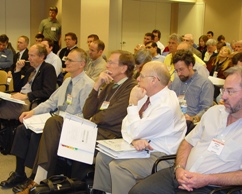
During a recent three-day workshop at the Metropolitan Washington Council of Governments (COG), dozens of the nation’s leading experts on nutrient removal gathered together to discuss new ways to improve water quality.
Local participants from the metropolitan Washington region said the workshop was valuable because the high level of nutrients in the Chesapeake Bay and its tributaries is becoming a more serious and costly issue. In addition to learning about the latest technological advancements in nutrient removal for wastewater plants, participants identified critical research gaps and priority research needs, which is critical given the limited public funds available for testing and implementing these projects.
“We are hearing about a combination of what is possible, practical, and how to turn what we have learned into policy,” said Dr. Glen Daigger of CH2M Hill, who served as Chairman of the Committee that organized the workshop. According to Dr. Sudhir Murthy from the District of Columbia Water and Sewer Authority (DC WASA), the participants all shared a desire for policy to be based on sound science.
Organizers said the workshop, which was sponsored by COG, DC WASA, and the Virginia Military Institute through a Water Environment Research Foundation (WERF) grant, was the first of its kind to attract a diverse group of regulators, academics, and wastewater utility operators in the discussion. Local representatives from Prince William County, Washington Suburban Sanitary Commission, Fairfax County, DC WASA, Arlington County and Loudoun County Sanitation Authority joined with state and EPA representatives as well as participants from Canada and Germany.
“This workshop is providing us with an understanding of the amount of research that is going on and of the types of tools available to correct these [water quality] issues,” said Marcia Degen of the Virginia Department of Environmental Quality.
WERF will use the output and feedback from the workshop to determine future priorities and focus on further research needs.
The workshop illustrates COG’s active leadership in addressing its members' interests in critical water quality issues for the region. It is part of continuing efforts to support the exchange of technical information and improve communication between regulators and the regulated community.